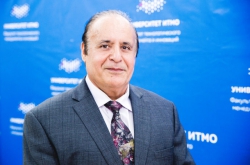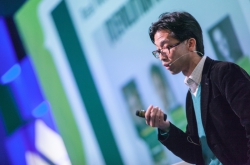The Heidelberg Laureate Forum is held every year at the end of September in the German city of Heidelberg. The HLF was initiated by the German foundation Klaus Tschira Stiftung (KTS), which promotes natural sciences, mathematics and computer science, together with the Heidelberg Institute for Theoretical Studies (HITS). The first HLF took place in 2013. Each year, only one Noble Pribe winner is invited to take part in the event as a speaker. This year’s special guest was William Phillips, an American scientist and laureate of the 1997 Nobel Prize in Physics.

Bachelor’s, Master’s, PhD and postdoc students can apply for participation in the forum. The application process starts in November and ends in February. All the expenses are covered by the host party; all you have to do is to fill in the application form correctly. You’re also supposed to submit a motivation letter in which you should write about your field of studies and research interests, and enclose a list of your publications. Apart from that, you’ll need three recommendation letters from the representatives of the scientific community, a university degree, and other documents (the full list is available here).
This year, the forum was attended by 200 promising scientists from 80 countries, as well as accomplished prize laureates and specialists in the fields of maths and computer science who helped in the selection of participants. The attendees had an extensive program of academic events they could choose from, which included lectures by leading experts, workshops, hot topic discussions and poster sessions. They were also given a one-off chance of visiting state-of-the-art research centers and innovative companies located in the Heidelberg’s suburbs.

“The forum coordinators went out of their way to make our stay interesting and memorable and offered participants a program jam-packed with activities from 8am to 10pm. The first half of the day was usually dedicated to lectures by famous scientists. I was especially impressed by the presentations of the 1997 Nobel Prize in Physics laureate William Phillips and developer-legend Leslie Lamport, who is most known for inventing the LaTeX software package which is now widely used the world over. He gave a perfectly thought-out and delivered talk about why you don’t need to use programming languages if you don’t actually write programs. One day was spent on visiting research institutes near Heidelberg. We could go to the Max Planck Institute for Astronomy, the SAP headquarters and other landmark places which we’d chosen a month and a half before our arrival. My personal choice was the European Molecular Biology Laboratory, which is an international organization with a principal laboratory in Heidelberg. Workshops were another form of the forum activities. They are compulsory for all participants, but, similar to our field trips, we chose the topics ourselves. I opted for the ones connected to deep learning, but there were other interesting topics like creating a successful research group, the future of mathematical physics, computer science ethics and so on. Hot topic discussions included buzzing spheres like blockchain and cryptocurrencies. Another important issue was increasing women’s involvement in science,” shared the PhD student.

But it was the opportunity to speak with world-renowned scientists in an informal dinner setting that was the star attraction of the program. Each dinner table was headed by one of the acclaimed laureates, and participants could choose the person they wanted to join. Javlon Isomurodov managed to rub shoulders with Sanjeev Arora, winner of the 2011 ACM Prize in Computing that recognized his impressive accomplishments in high-performance computing, as well as the 2013 Turing Award laureate Leslie Lamport, decorated for his invaluable contribution to the theory and practice of distributed and parallel computing.
“I do research in the field of bioinformatics: for example, my Master’s thesis focused on the search of active modules in protein-protein interaction networks. If we allow some abstraction, an active module is nothing more than a set of genes responsible for a particular disease. My task was to create the models that adopt the structure and expression of the genes at the input and return the most probable active module at the output. The forum gave me the chance to meet other young scientists doing similar tasks, which was a very rewarding and useful experience,” said Javlon Isomurodov.

All Heidelberg lectures are available on the forum's YouTube channel.




